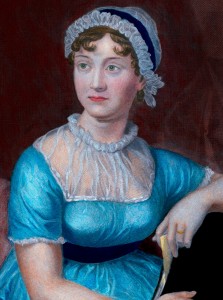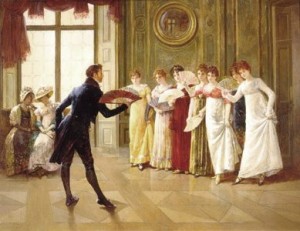Pride and Prejudice: Centerstage serves layered cake without any punch
“May I have this dance?” The cast of Pride and Prejudice at Centerstage. (Richard Anderson)
We’ve all been to that party. You know, the one where it’s obvious the host went to a lot of trouble to entertain her guests. She had plenty of food and wine on hand, her home looked immaculate, and there was an interesting, ever expanding list of invitees. And yet, something was missing. The music wasn’t quite right; the conversation seemed forced or uncomfortably stilted. Even humorous asides sounded harsh or over rehearsed. And that guest list? Someone who should have been there was purposely left out. If you’ve ever been to that peculiar party, then you have a sense of what to expect from Pride and Prejudice – the season opening offering at Centerstage.
Torn from the pages (well, some of them anyway) of the classic novel by Jane Austen, this Centerstage production tells the story of five – er, make that four – unmarried young women and the contortions their parents go through to send them merrily into wifedom. Along the way, this eager group of Regency-era siblings are alternately romanced and/or rejected by benevolent beaus, randy red coats and one pitifully pompous parson.

The central character in Pride and Prejudice is the second oldest daughter; Elizabeth. Smart as a whip, but not quite as pretty as her older sister Jane, Elizabeth watches approvingly as Jane falls for a cheery gent in a blue coat named Mr. Bingley. Meanwhile, Bingley’s brooding friend, Mr. Darcy seems completely taken with Elizabeth. She is unimpressed – preferring the company of a handsome, but roguish British officer named Wickham. Younger sisters Mary and Lydia (respectively) are somewhat plain and frivolous. Sister Kitty is mostly absent in the novel and completely missing from this adaptation. Who says you can’t improve on one of the most popular novels in the history of English literature? Other characters include the young women’s parents – the overtaxed but even tempered Mr. Bennett; his hyperbolic wife Mrs. Bennett; Mr. Collins – the unintentionally colorful cleric destined to someday own the Bennett’s home, etc. All the makings of a scandal-ridden soap opera complete with fall-front pants.
Owing to its popularity, Pride and Prejudice has come to life with numerous adaptations, the best of which maybe the 1995 BBC mini-series starring Jennifer Ehle and Colin Firth. Perhaps it’s unfair to be familiar with that excellent version when considering the current Centerstage adaptation by Christopher Baker, but it is worth noting that nuance is an indispensable element to Austen’s beloved novel; something the BBC series had that is woefully missing from this Centerstage production.
That’s not to say the acting is abominable or the production is totally lacking. To the contrary – this is a beautifully staged play with many fine performances.
Particularly pleasing are Erin Neufer as the easy-going Jane Bennett; Victoria Frings as the somewhat calculating Miss Caroline Bingley; Josh Salt as the ever jovial Mr. Bingley and Ali Rose Dachis as the careless Lydia Bennett.
Chris Bolan (Mr. Collins) and Mary Jo Mecca (Mrs. Bennett) both do a phenomenal job with the two most outlandish parts in an otherwise measured manuscript.
On the down side – both A.J. Shively (Mr. Darcy) and Asher Grodman (Mr. Wickham) tend to underplay their parts – making their character’s adversarial relationship ring somewhat hollow. Turning quickly on one’s heels to exit the scene doesn’t necessarily convey the depth of dislike these two harbor towards each other.

Maya Brettell’s way-too-young Mary Bennett comes across as spoiled and childish, contrary to the conceited and clueless late-teenaged character of the novel. One has to blame the casting director there. And finally, Elizabeth – as portrayed by Kate Abbruzzese – is far too abrasive. Here is where the lack of subtlety in this production is most glaring. As any fan can tell you, Elizabeth Bennett is a strong, intelligent woman who asserts her empowering views with levity, undeniable elegance and charm. To play her as a controlling bitch is sadly a bow to these emasculating times and wholly at odds with the captivating character Jane Austen carefully created. There is also a vocal harshness Abbruzzese will need to address if she hopes to last very long as a stage actress.
Perhaps the best moment for Abbruzzese (Elizabeth) and Shively (Darcy) is their almost effortless, conversational dance sequence. It’s the one scene where the two actors appear most at ease with their parts and some credit here is due to the choreography of Paloma McGregor. Ilono Somogyi’s period correct costumes worked reasonably well – save for the monk strap loafers some of the men were obliged to wear. Scott Bradley’s malleable set design made the numerous scene changes a breeze.
Original music for this production was provided by the aptly named Broken Chord. I think I’ll just leave it at that.
Director Hana S. Sharif should not be surprised to see people leaving Pride and Prejudice at intermission. It’s not that the show is terrible – it is simply not terribly engaging. Besides, as anyone from proper society can tell you, it is impolite to muddle a masterpiece. Or, to quote Elizabeth Bennett, “You must learn some of my philosophy. Think only of the past as its remembrance gives you pleasure.”

Anthony C. Hayes is an actor, author, raconteur, rapscallion and bon vivant. A one-time newsboy for the Evening Sun and professional presence at the Washington Herald, Tony’s poetry, photography, humor, and prose have also been featured in Smile, Hon, You’re in Baltimore!, Destination Maryland, Magic Octopus Magazine, Los Angeles Post-Examiner, Voice of Baltimore, SmartCEO, Alvarez Fiction, and Tales of Blood and Roses. If you notice that his work has been purloined, please let him know. As the Good Book says, “Thou shalt not steal.”
